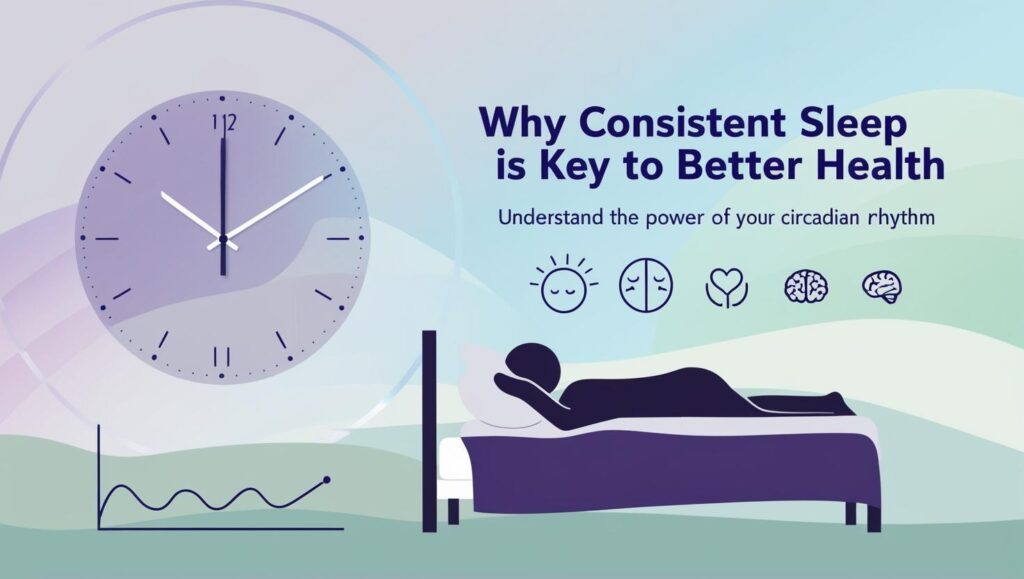Introduction
In our lopsided and hyper-connected times, sleep often becomes some kind of second-string priority, to be sacrificed in favor of the office, social media and hobbies. We’ve all heard of the expression “I’ll catch up on sleep later” but what if we told you sleeping late could be a lot harmful than just waking up the next day sleepy? Recent scientific studies have found that erratic sleeping habits are associated with serious health risks, including heart disease, diabetes, mental health disorders and even premature death.
Understanding the importance of regular sleep to your health — and the reasons why you can’t “catch up” on sleep — could change the way you think about sleep. Now, let’s delve into the science of circadian rhythms, the effects of irregular sleep schedules and tips for improving your sleep hygiene so that you live a healthier life.
What is the Circadian Rhythm, and Why Does It Matter?
Your circadian rhythm — sometimes called the body’s internal clock — governs when you’re asleep and when you’re awake. It affects when you feel energized and alert and when your body begins to dim down for the night. This cycle, which works on a 24-hour cycle, is governed by a cluster of cells in your brain’s hypothalamus. These cells respond to external cues — like light, temperature and food intake — telling your body when to release hormones, such as melatonin and cortisol.

- Melatonin, known as the “sleep hormone,” is produced in response to darkness and makes you feel sleepy.
- Cortisol, on the other hand, is a stress hormone that is highest in the morning, helping you wake up and feel alert.
When your circadian rhythm is aligned with your environment — like waking with the sunrise and going to sleep at a relatively similar time every night — your body operates best. This consistency leads to better quality of sleep, a better mood, and improved overall health.
But when your sleep schedule varies, your circadian rhythm becomes desynchronized, causing a number of physical and mental health issues.
Why Consistency is More Important Than Sleep Duration
You’ve probably heard people say, “You can catch up on sleep later,” particularly when staying up late working late or enjoying late-night entertainment. But new studies indicate that it’s not just how much sleep you’re getting but how consistently you sleep.
Studies on Irregular Sleep Patterns: The Hidden Risks
But a new study, the largest of its kind, of 72,269 men and women ages 40 to 79, adds to the evidence that sleep disturbances and cardiovascular health can be linked to irregular sleep patterns. Researchers monitored the sleep patterns of participants over a week using activity trackers and categorized them into three groups: regular sleepers, irregular sleepers and those with both types.
Results: Over 8 years, irregular sleepers were 26% more likely to suffer a major cardiovascular event, such as heart attack or stroke, than regular sleepers.
This data supports previous research that suggested irregular sleep patterns are linked to an increased risk of heart disease, high blood pressure, and stroke, even among those who get a sufficient amount of sleep.
Chart 1: Risk of Cardiovascular Events Based on Sleep Consistency
| Sleep Pattern | Risk of Cardiovascular Event (%) |
|---|---|
| Most Regular | 15% |
| Most Irregular | 26% |
| Mixed Regularity | 20% |
Another study conducted earlier this year using data from the UK Biobank found a similar trend. People with the most irregular sleep patterns—those whose sleep times varied by more than 60 minutes from night to night—had a 34% higher risk of developing type 2 diabetes compared to those with regular sleep schedules.
Irregular Sleep and Its Impact on Mental Health
It’s well known that poor sleep can affect your mood, but new studies are showing that sleep consistency plays a much larger role in mental well-being than previously thought. People with irregular sleep patterns are more likely to experience:
- Depression
- Anxiety
- Mood swings
- Reduced cognitive performance
A study of 2,100 medical interns, whose work schedules vary daily, found that those with inconsistent sleep patterns were more prone to bad moods and had a higher likelihood of developing depression. Sleep consistency is an underappreciated factor in maintaining a healthy mindset.
- Survey Data: A survey conducted by the University of Michigan Medicine revealed that 47% of interns with irregular sleep schedules experienced significant mood disorders, compared to just 22% of interns with regular sleep patterns.
This insight underscores the importance of sleep regularity as part of a mental health strategy—particularly for those with demanding work schedules. Inconsistent sleep disrupts the body’s ability to regulate emotions, making it harder to manage stress and stay emotionally balanced.
The Gut Microbiome and Sleep: A Connection You Might Not Have Known
Sleep has firmly established correlations with heart health and mental well-being, but an interesting, emerging area of research is the role of sleep patterns in the gut microbiome.
There are trillions of bacteria in your gut, many of which help digest food, regulate metabolism and even affect mood and immune function. In recent months, studies have found that irregular sleep, particularly when a person’s sleep schedule varies by more than 90 minutes from night to night, can throw the gut microbiome out of whack, raising the levels of harmful bacteria that can lead to heart disease, diabetes and obesity.
The Harvard Medical School had such a study which showed a gut microbiome of the participants which were very much altered, as there were more harmful bacteria and few beneficial ones in participants with irregular sleep patterns. These imbalances result in inflammation and metabolic disruptions, providing additional insight into the correlations between irregular sleep and chronic health conditions like diabetes and cardiovascular diseases.
- Chart 2: The Impact of Sleep Variability on Gut Health
| Sleep Variability (Minutes) | Change in Gut Microbiome (%) | Risk of Metabolic Disorders (%) |
|---|---|---|
| Less than 30 minutes | +5% beneficial bacteria | 10% |
| 30–60 minutes | +2% beneficial bacteria | 18% |
| More than 90 minutes | -8% beneficial bacteria | 34% |
Improving Sleep Consistency: Tips for Better Health
Now that we understand why consistent states are important, let’s look into how to improve our sleep hygiene to better our circadian rhythm.
1. Set a Regular Sleep Schedule
One of the best ways to help sleep quality and support your body’s internal clock is to go to bed and wake up at the same time every day — even on weekends. This regularity can help reinforce your circadian rhythm, making it easier to fall asleep as well as awake feeling refreshed.
2. Limit Light Exposure at Night
Your body’s internal clock is extremely influenced by light. No bright screens (phone, computer, TV) for at least an hour before bed. If you have to use screens, try to wear blue-light blocking glasses or use blue light blocking apps.
3. Create a Relaxing Bedtime Routine
Establish a routine that cues your body it’s time to settle down. This could be reading, meditating, or taking a warm bath. Try to steer clear of stimulating activities, like heavy HIIT workouts or stressful work projects, close to bedtime.
4. Be Mindful of What You Eat and Drink
Heavy meals, caffeine and alcohol can disrupt your sleep. Avoid large meals or caffeinated drinks for at least four hours before sleeping. Alcohol can help you nod off more quickly, but it also changes the sleep cycle later in the night.
5. Optimize Your Sleep Environment
Make your sleep environment as ideal as possible: cool, quiet and pitch-black. Get a good quality mattress and pillows that promote your sleeping style.
Conclusion: Prioritize Sleep Consistency for Better Health
Sleep runs far deeper than merely a time to lay your head — it is an essential part of physical and mental health. The solution is obvious: irregular sleep — with a sleep schedule changing from day to day — is linked to a higher risk of heart disease, diabetes and mental health problems. Your circadian rhythm is all about consistency, and the single best way to strengthen it is through regular sleep.
Although catching up on sleep after a few late nights might feel like a remedy, it’s your sleep routine that has the greatest long-term benefits. Through healthier sleep habits and a consistent sleep routine you can improve your overall quality of life, physical health, as well as mental clarity.
So, the next time you’re tempted to burn the midnight oil or miss a night’s sleep, keep the long haul in mind. Your body has a reset button, sleep, and you want to hit it at the same hour each night.
If you enjoyed this post, please spread the knowledge and share it with your friends! And if you’re interested in more sleep tips or how to optimize your sleep for better health, stay tuned for new blog posts and pharmacotherapy-u areas or subscribe to our newsletter.



